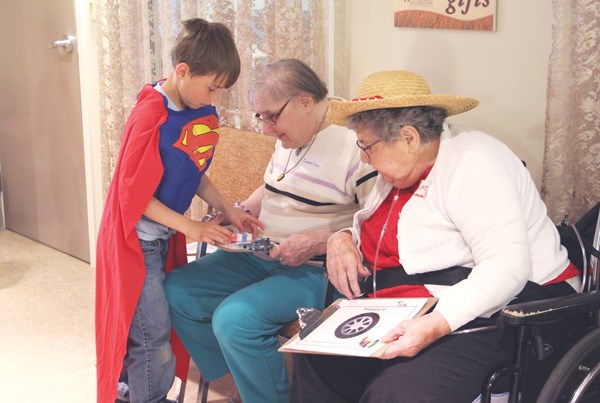Every Friday, the Grade 1 class at Columbia School gets a chance to get out of their classroom and meet some old friends. The class is in an intergenerational classroom, with students from the class going to the Yorkton and District Nursing Home to have class with the elders.
Teacher Robin Heshka explains that their afternoon with the seniors is a regular class for the students. The material is part of the regular curriculum – measurement when Yorkton This Week visited the class – but the difference is that they do the class with residents of the Yorkton and District Nursing Home in the room, helping the students, asking questions and being friends to the class.
Heshka came across the idea for an intergenerational classroom when she was doing her Masters in University.
“I knew right away that it was something I wanted to do. I have my buddy from my life, her name is Annie Romaniuk, we still have a really close connection. I looked back on my life and realized how important those buddies were to me out on my farm in the Gorlitz area... I realized that there is so much knowledge to be shared on both ends.”
The kids are certainly fans of the program, and when they arrived to meet their buddies there were hugs to go around to everyone in the room. Heshka says that since there are weeks where they can’t go, whether due to school schedules or the schedules at the nursing home, the kids are eager and excited days before to find out if they are able to get there.
“When you get here and you see those hugs and you see those buddies light up, it’s amazing.”
There are three levels of intergenerational classrooms, as described by the three bears. Papa Bear is a class being located completely within the nursing home. Heshka’s class is in the Mama Bear class, as they come to the nursing home on a regular basis, Friday afternoons in their case. Baby Bear is when a class would make a visit occasionally, such as having the students sing for the elders on a special occasion.
The program is one of the best that the nursing home has ever done, says Suzanne Beck, director of therapeutic recreation.
“Truly they get to be parents and grandparents again. It’s full engagement, the kids love them, the residents love the kids.”
Beck believes that the residents have added purpose with the kids coming in. The residents become something like “adopted grandparents” and there is a connection between them and the kids.
“Lots of times when they’ve come to long term care facilities, they have lost a lot of things. They’ve lost their home, control over their banking, there’s a lot of loss. I think with this happening, it gains some control, therefore some self esteem and some belonging.”
An added advantage is that kids see disability as something normal, and do not fear the accessories the come with it, Beck explains.
“The children are not judgemental, they see it as part of a school environment. Wheelchairs and walkers, they’re just normal. I think there’s a generation here that when they see a wheelchair or when they see people with a disability, it won’t bother them.”
It’s also not a lot of work for the nursing home itself, as Heshka brings her class and teaches the curriculum, and they have little they need to do otherwise. Beck wants to see this as a permanent fixture of the school.
Heshka plans for this to be a regular feature of her class, but she would like to see the program spread, both to other schools and other communities. She knows many smaller communities still have both schools and nursing homes, and she thinks it would be great if they could connect and develop a similar program.
She would also like to thank the parent volunteers and nurses at the nursing home for making the program possible.




